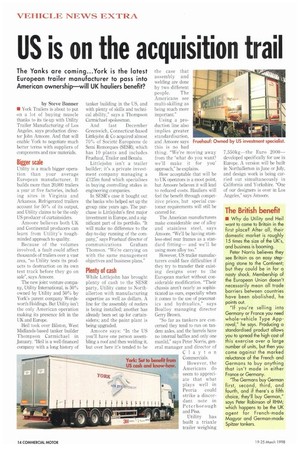US is on the acquisition trail
Page 16

If you've noticed an error in this article please click here to report it so we can fix it.
The Yanks are coming...York is the latest European trailer manufacturer to pass into American ownership—will UK hauliers benefit?
by Steve Banner • York Trailers is about to put on a lot of buying muscle thanks to its tie-up with Utility Trailer Manufacturing of Los Angeles, says production director John Amoore. And that will enable York to negotiate much better terms with suppliers of components and raw materials.
Bigger scale
Utility is a much bigger operation than your average European manufacturer. It builds more than 20,000 trailers a year at five factories, including sites in Virginia and Arkansas. Refrigerated trailers account for 50% of its output, and Utility claims to be the only US producer of cuttainsiders.
Amoore believes both UK and Continental producers can learn from Utility's toughminded approach to quality.
Because of the volumes involved, a fault could affect thousands of trailers over a vast area, "so Utility tests its products to destruction on its own test track before they go on sale", says Amoore.
The new joint venture company, Utility International, is 50% owned by Utility and 50% by York's parent company Wordsworth Holdings, But Utility isn't the only American operation making its presence felt in the UK and Europe.
Heil took over Bilston, West Midlands-based tanker builder Thompson Carmichael in January. "Heil is a well-financed company with a long history of tanker building in the US, and with plenty of skills and technical ability," says a Thompson Carmichael spokesman.
And last December Greenwich, Connecticut-based Littlejohn & Co acquired almost 70% of Societe Europeene de Semi Remorques (SESR), which has 10 plants and includes Fruehauf, Trailor and Benalu.
Littlejohn isn't a trailer builder; it's a private investment company managing a 1125m fund which specialises in buying controlling stakes in engineering companies.
In SFSR's case it bought out the banks who helped set up the group nine years ago. The purchase is Littlejohn's first major investment in Europe. and a significant part of its portfolio. "It will make no difference to the day-to-day running of the company," says Fruehauf director of communications Graham Thomson. "We're carrying on with the same management objectives and business plans."
Plenty of cash
While Littlejohn has brought plenty of cash to the SESR party, Utility came to Northallerton with manufacturing expertise as well as dollars. A line for the assembly of reefers is being installed; another has already been set up for curtainsiders; and the paint plant is being upgraded.
Amoore says: "In the US you'll have one person assembling a roof and then welding it, but over here it's tended to be the case that assembly and welding are done by two different people. The Americans see multi-skilling as being much more important."
Using a production line also implies greater standardisation, and Amoore says this is no bad thing. "We're moving away from the 'what do you want? we'll make it for you' approach," he explains.
How acceptable that will be to UK operators is a moot point, but Amoore believes it will lead to reduced costs. Hauliers will feel the benefit through competitive prices, but special customer requirements will still be catered for.
The American manufacturers make considerable use of alloy and stainless steel, says Amoore. "We'll be having stainless-steel rear frames as a standard fitting— and we'll be using more alloy too."
However, US trailer manufacturers could face difficulties if they try to transfer their existing designs over to the European market without considerable modification. "Their chassis aren't nearly as sophisticated as ours, especially when it comes to the use of pneumatics and hydraulics," says BoaHoy managing director Gerry Brown.
"So far as tankers are concerned they tend to run on tandem axles, and the barrels have no internal baffles and only one manlid," says Peter Norris, general manager and director of Clayton Commercials.
However, the Americans do seem to appreciate that what plays well in Peoria could strike a discordant note in Peterborough and Pisa.
Utility has built a triaxle trailer weighing
7,550kg—the Euro 2000— developed specifically for use in Europe. A version will be built in Northallerton in June or July, and design work is being carried out simultaneously in California and Yorkshire. "One of our designers is over in Los Angeles," says Amoore.
The British benefit
• Why do Utility and Heil want to come to Britain in the first place? After all, their domestic market is roughly 15 times the size of the UK's, and business is booming.
Peter Norris believes they see Britain as an easy stepping stone to the Continent; but they could be in for a nasty shock. Membership of the European Union doesn't necessarily mean all trade barriers between countries have been abolished, he points out.
"If you're selling into Germany or France you need whole-vehicle Type Approval," he says. Producing a standardised product allows you to spread the high cost of this exercise over a large number of units, but then you come against the marked reluctance of the French and Germans to buy anything that isn't made in either France or Germany.
-The Germans buy German first, second, third, and fourth, and if there's a fifth choice, they'll buy German," says Peter Robinson of RHM; which happens to be the UK agent for French-made Magyar and German-.made Spitzer tankers.




























































































































